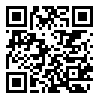Volume 16, Issue 2 (8-2010)
Research on Information Science and Public Libraries 2010, 16(2): 5-27 |
Back to browse issues page
Download citation:
BibTeX | RIS | EndNote | Medlars | ProCite | Reference Manager | RefWorks
Send citation to:



BibTeX | RIS | EndNote | Medlars | ProCite | Reference Manager | RefWorks
Send citation to:
Hasanzadeh M, Navidi F. A Comparative Study on the Application of Different Methods for Evaluating the Accessibility of Websites(Case Study:
Websites of Ministries of Iranian Government)
. Research on Information Science and Public Libraries 2010; 16 (2) :5-27
URL: http://publij.ir/article-1-84-en.html
URL: http://publij.ir/article-1-84-en.html
Tarbiat Modares University, Tehran , hasanzadeh@modares.ac.ir
Abstract: (11008 Views)
Purpose: The present research aims to comparatively study different methods for evaluating the accessibility of websites and analyze the results of case study concerning websites of ministries of Iranian government, in order to indicate the strengths, weaknesses, and differences in evaluation findings by applying each of website accessibility methods.
Methodology: In this paper, initially the previously performed studies regarding websites’ accessibility have been reviewed. In next section, a survey was made on methods for accessibility evaluation, as well as comparison of advantages and drawbacks of each method. Finally, results of accessibility evaluation on websites of ministries of Iranian government (including 21 ministries) have been compared based upon manual evaluation methods, automatic evaluation methods, and evaluation of clients’ experiences. Manual evaluation was carried out using 12 indices extracted from web content accessibility guidelines (WCAG) provided by worldwide web consortium: W3c/wai 1.0. Also, evaluation of clients’ experiences was accomplished by survey based on focus groups and replying the questionnaire. Automatic evaluation was achieved by Webxact automatic software.
Findings: Considering different findings of these three evaluation methods, it can be stated that automatic evaluation tools can be utilized only for recognition of websites’ errors, since these software precisely provide a list of errors for each priority and are website developers’ guide for correcting the errors. Results of merely evaluating client’s experience are not useful, as some personal opinion may change the results. If human experts would be present, interpretation of errors and making practical suggestions are possible in manual evaluation method. Therefore, considering the remarkable difference observed between findings of these three evaluation methods, use of an integrated evaluation method including the three aforementioned ones was confirmed.
Originality/Value: No research has so far comparatively evaluated the methods for evaluation of websites’ accessibility. Besides theoretical comparison of the existing methods, the present research reports in an objective manner the application of mentioned methods in an objective study.
Methodology: In this paper, initially the previously performed studies regarding websites’ accessibility have been reviewed. In next section, a survey was made on methods for accessibility evaluation, as well as comparison of advantages and drawbacks of each method. Finally, results of accessibility evaluation on websites of ministries of Iranian government (including 21 ministries) have been compared based upon manual evaluation methods, automatic evaluation methods, and evaluation of clients’ experiences. Manual evaluation was carried out using 12 indices extracted from web content accessibility guidelines (WCAG) provided by worldwide web consortium: W3c/wai 1.0. Also, evaluation of clients’ experiences was accomplished by survey based on focus groups and replying the questionnaire. Automatic evaluation was achieved by Webxact automatic software.
Findings: Considering different findings of these three evaluation methods, it can be stated that automatic evaluation tools can be utilized only for recognition of websites’ errors, since these software precisely provide a list of errors for each priority and are website developers’ guide for correcting the errors. Results of merely evaluating client’s experience are not useful, as some personal opinion may change the results. If human experts would be present, interpretation of errors and making practical suggestions are possible in manual evaluation method. Therefore, considering the remarkable difference observed between findings of these three evaluation methods, use of an integrated evaluation method including the three aforementioned ones was confirmed.
Originality/Value: No research has so far comparatively evaluated the methods for evaluation of websites’ accessibility. Besides theoretical comparison of the existing methods, the present research reports in an objective manner the application of mentioned methods in an objective study.
Keywords: Accessibility evaluation, Websites of ministries, Case study, Automatic evaluation, Manual evaluation
Type of Study: quantitative |
Subject:
Cultural Studies
Received: 2012/08/2 | Accepted: 2018/02/14 | Published: 2018/02/14
Received: 2012/08/2 | Accepted: 2018/02/14 | Published: 2018/02/14
Send email to the article author
| Rights and permissions | |
 |
This work is licensed under a Creative Commons Attribution-NonCommercial 4.0 International License. |





